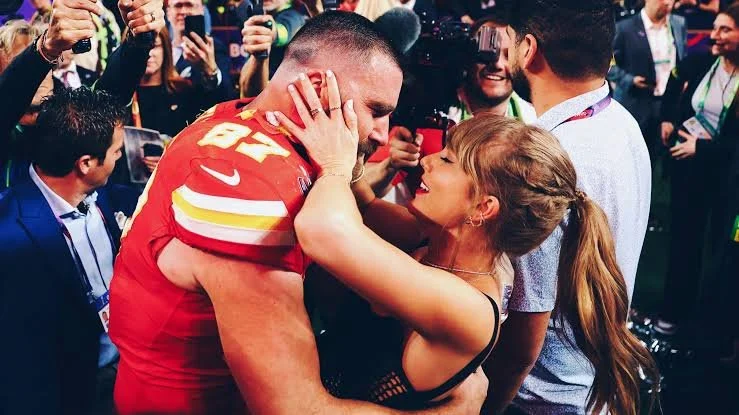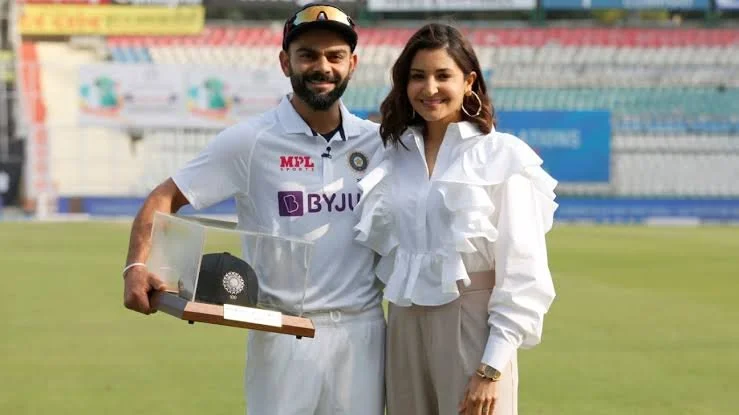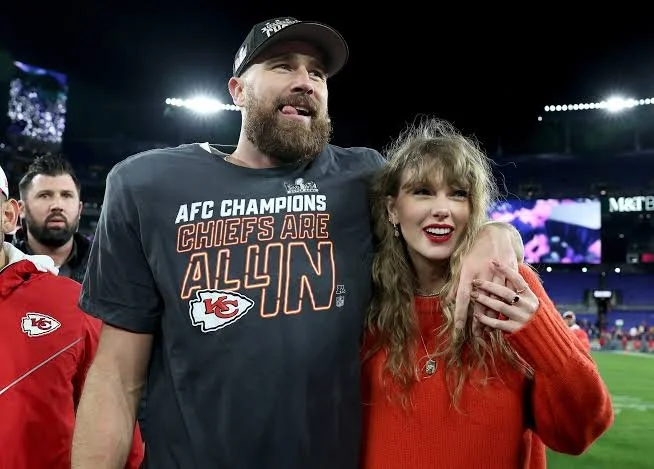When the Game Gets Tough, Why Do Women Always Get the Blame?
Blaming women for their partner's professional performance is an age-old, sexist narrative that seems to rear its ugly head every time a player underperforms. Recently, Taylor Swift found herself at the center of this tired trope when NFL fans blamed her for Travis Kelce's seemingly "subpar" performances.
Whoopi Goldberg even had to step in and remind everyone to "shut up" because blaming Swift for Kelce's play is absurd and sexist. She pointed out that the Kansas City Chiefs are actually doing quite well this season, despite some fans' complaints about Kelce's stats.
Travis & Taylor (Getty Images)
This isn't the first time we've seen a woman being unfairly targeted when her partner has an off day. Remember when Indian actor Anushka Sharma was blamed for cricketer Virat Kohli's poor performance on the cricket field? Kohli, one of the best cricketers in the world, faced a barrage of comments blaming Sharma for his form whenever he had a bad day at the crease. It got so bad that Kohli himself had to step in and call out the trolls, defending his wife and condemning the sexist attacks.
Virat Kohli & Anushka Sharma (BCCI)
This pattern of blaming wives or girlfriends for their partners' struggles isn't just a few isolated incidents; it's a pervasive cultural issue. Whether it's media commentators hinting that players are "distracted" by their relationships or fans outright blaming these women, the message is clear: When a man fails, a woman must somehow be at fault.
Wayne Rooney & Coleen (Getty Images)
It's not just celebrities like Swift and Sharma either. Take soccer star Wayne Rooney and his wife Coleen. Coleen was blamed for supposedly distracting Wayne with family matters during his career's ups and downs. Similarly, Gisele Bündchen faced criticism when Tom Brady didn't perform to expectations, with some suggesting that his commitment to his family life was "softening" him up.
Why does this happen? It's a mix of sexism and the way sports fandom often skews toward male audiences who might not always be aware of their own biases. Women partners are seen as encroaching on the "sacred" territory of men's sports, and any dip in performance is viewed through this toxic lens.
Criticizing these women also perpetuates the idea that their primary role should be to support and not "distract" their partners from their "more important" professional duties. This damaging narrative reduces these women to the status of accessories in their partners' lives rather than individuals with their own careers, passions, and identities.
The irony in blaming Swift is especially rich, given her status as one of the most successful musicians of our time. Shouldn't Kelce be more worried about "distracting" her, considering her multi-platinum albums, sold-out stadium tours, and a cultural influence that spans the globe? But of course, no one would think to say that because the idea that a man could "distract" a successful woman from her career isn't part of the narrative we're used to.
Ultimately, this kind of commentary isn't just unfair; it's harmful. It reflects a broader issue where women are expected to be invisible supporters, never stepping into the limelight or "interfering" with the male world of sports. Until this narrative changes, we'll keep seeing successful women being dragged through the mud for simply existing alongside their partners.
So, the next time a player has a bad game, let's leave their partners out of it. Taylor Swift isn't running routes on the field, and Anushka Sharma isn't holding a cricket bat. Blaming them for their partners' performance is lazy, sexist, and completely uncalled for. Instead, let's celebrate these women for their own achievements and call out the trolls who think it's okay to reduce them to mere distractions.





